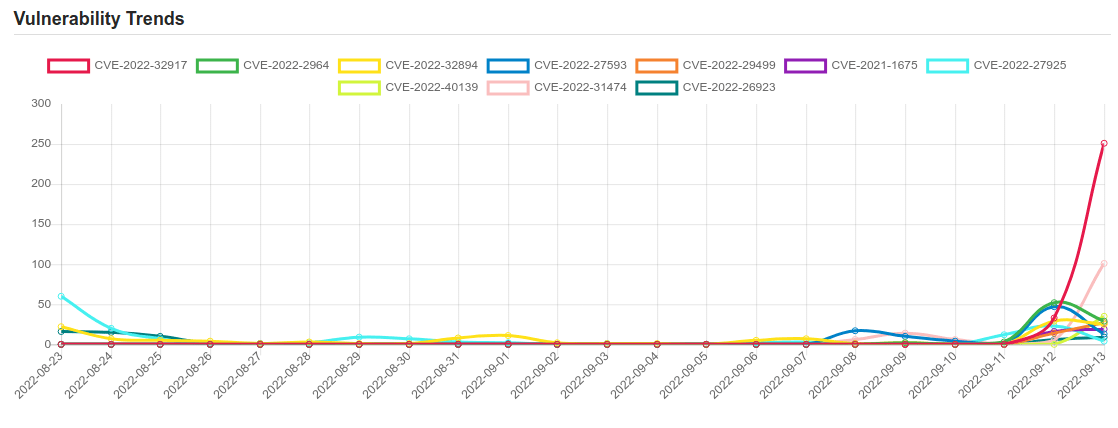Daily Vulnerability Trends: Wed Sep 14 2022

| CVE NAME | CVE Description |
| CVE-2022-40139 | No description provided |
| CVE-2022-31474 | No description provided |
| CVE-2022-26923 | Active Directory Domain Services Elevation of Privilege Vulnerability. |
| CVE-2022-36804 | Multiple API endpoints in Atlassian Bitbucket Server and Data Center 7.0.0 before version 7.6.17, from version 7.7.0 before version 7.17.10, from version 7.18.0 before version 7.21.4, from version 8.0.0 before version 8.0.3, from version 8.1.0 before version 8.1.3, and from version 8.2.0 before version 8.2.2, and from version 8.3.0 before 8.3.1 allows remote attackers with read permissions to a public or private Bitbucket repository to execute arbitrary code by sending a malicious HTTP request. This vulnerability was reported via our Bug Bounty Program by TheGrandPew. |
| CVE-2022-39135 | In Apache Calcite prior to version 1.32.0 the SQL operators EXISTS_NODE, EXTRACT_XML, XML_TRANSFORM and EXTRACT_VALUE do not restrict XML External Entity references in their configuration, which makes them vulnerable to a potential XML External Entity (XXE) attack. Therefore any client exposing these operators, typically by using Oracle dialect (the first three) or MySQL dialect (the last one), is affected by this vulnerability (the extent of it will depend on the user under which the application is running). From Apache Calcite 1.32.0 onwards, Document Type Declarations and XML External Entity resolution are disabled on the impacted operators. |
| CVE-2022-32250 | net/netfilter/nf_tables_api.c in the Linux kernel through 5.18.1 allows a local user (able to create user/net namespaces) to escalate privileges to root because an incorrect NFT_STATEFUL_EXPR check leads to a use-after-free. |
| CVE-2013-3220 | bitcoind and Bitcoin-Qt before 0.4.9rc2, 0.5.x before 0.5.8rc2, 0.6.x before 0.6.5rc2, and 0.7.x before 0.7.3rc2, and wxBitcoin, do not properly consider whether a block’s size could require an excessive number of database locks, which allows remote attackers to cause a denial of service (split) and enable certain double-spending capabilities via a large block that triggers incorrect Berkeley DB locking. |
| CVE-2022-3075 | No description provided |
| CVE-2022-22629 | No description provided |
| CVE-2022-37969 | Windows Common Log File System Driver Elevation of Privilege Vulnerability. This CVE ID is unique from CVE-2022-35803. |
| CVE-2022-31676 | VMware Tools (12.0.0, 11.x.y and 10.x.y) contains a local privilege escalation vulnerability. A malicious actor with local non-administrative access to the Guest OS can escalate privileges as a root user in the virtual machine. |
| CVE-2022-34336 | IBM WebSphere Application Server 7.0, 8.0, 8.5, and 9.0 is vulnerable to cross-site scripting. This vulnerability allows users to embed arbitrary JavaScript code in the Web UI thus altering the intended functionality potentially leading to credentials disclosure within a trusted session. IBM X-Force ID: 229714. |
| CVE-2022-1700 | Improper Restriction of XML External Entity Reference (‘XXE’) vulnerability in the Policy Engine of Forcepoint Data Loss Prevention (DLP), which is also leveraged by Forcepoint One Endpoint (F1E), Web Security Content Gateway, Email Security with DLP enabled, and Cloud Security Gateway prior to June 20, 2022. The XML parser in the Policy Engine was found to be improperly configured to support external entities and external DTD (Document Type Definitions), which can lead to an XXE attack. This issue affects: Forcepoint Data Loss Prevention (DLP) versions prior to 8.8.2. Forcepoint One Endpoint (F1E) with Policy Engine versions prior to 8.8.2. Forcepoint Web Security Content Gateway versions prior to 8.5.5. Forcepoint Email Security with DLP enabled versions prior to 8.5.5. Forcepoint Cloud Security Gateway prior to June 20, 2022. |
| CVE-2022-2964 | A flaw was found in the Linux kernel’s driver for the ASIX AX88179_178A-based USB 2.0/3.0 Gigabit Ethernet Devices. The vulnerability contains multiple out-of-bounds reads and possible out-of-bounds writes. |
| CVE-2022-32894 | An out-of-bounds write issue was addressed with improved bounds checking. This issue is fixed in iOS 15.6.1 and iPadOS 15.6.1, macOS Monterey 12.5.1. An application may be able to execute arbitrary code with kernel privileges. Apple is aware of a report that this issue may have been actively exploited. |
| CVE-2022-27593 | An externally controlled reference to a resource vulnerability has been reported to affect QNAP NAS running Photo Station. If exploited, This could allow an attacker to modify system files. We have already fixed the vulnerability in the following versions: QTS 5.0.1: Photo Station 6.1.2 and later QTS 5.0.0/4.5.x: Photo Station 6.0.22 and later QTS 4.3.6: Photo Station 5.7.18 and later QTS 4.3.3: Photo Station 5.4.15 and later QTS 4.2.6: Photo Station 5.2.14 and later |
| CVE-2022-29499 | The Service Appliance component in Mitel MiVoice Connect through 19.2 SP3 allows remote code execution because of incorrect data validation. The Service Appliances are SA 100, SA 400, and Virtual SA. |
| CVE-2021-1675 | Windows Print Spooler Elevation of Privilege Vulnerability |
| CVE-2022-27925 | Zimbra Collaboration (aka ZCS) 8.8.15 and 9.0 has mboximport functionality that receives a ZIP archive and extracts files from it. An authenticated user with administrator rights has the ability to upload arbitrary files to the system, leading to directory traversal. |
| CVE-2022-32917 | Apple macOS Monterey, iOS and iPadOS privilege escalation | CVE-2022-32917 |
A considerable amount of time and effort goes into maintaining this website, creating backend automation and creating new features and content for you to make actionable intelligence decisions. Everyone that supports the site helps enable new functionality.
If you like the site, please support us on Patreon using the button below

To keep up to date follow us on the below channels.





